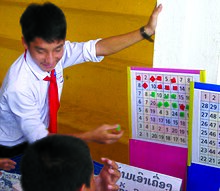
Back حساب (مهارة) Arabic সংখ্যাজ্ঞান Bengali/Bangla Numerismo Spanish Numératie French Ọnụ ọgụgụ IG Far di conto Italian Gecijferdheid Dutch Tallforståelse NB Numeracia Portuguese Числовая грамотность Russian


Numeracy is the ability to understand, reason with, and apply simple numerical concepts.[1] The charity National Numeracy states: "Numeracy means understanding how mathematics is used in the real world and being able to apply it to make the best possible decisions...It's as much about thinking and reasoning as about 'doing sums'". Basic numeracy skills consist of comprehending fundamental arithmetical operations like addition, subtraction, multiplication, and division. For example, if one can understand simple mathematical equations such as 2 + 2 = 4, then one would be considered to possess at least basic numeric knowledge. Substantial aspects of numeracy also include number sense, operation sense, computation, measurement, geometry, probability and statistics.[citation needed] A numerically literate person can manage and respond to the mathematical demands of life.[2][3]
By contrast, innumeracy (the lack of numeracy) can have a negative impact. Numeracy has an influence on healthy behaviors, financial literacy, and career decisions. Therefore, innumeracy may negatively affect economic choices, financial outcomes, health outcomes, and life satisfaction.[3][4][5] It also may distort risk perception in health decisions.[6] Greater numeracy has been associated with reduced susceptibility to framing effects, less influence of nonnumerical information such as mood states, and greater sensitivity to different levels of numerical risk.[7] Ellen Peters and her colleagues argue that achieving the benefits of numeric literacy, however, may depend on one's numeric self-efficacy or confidence in one's skills.[8]
- ^ Brooks, M.; Pui (2010). "Are individual differences in numeracy unique from general mental ability? A closer look at a common measure of numeracy". Individual Differences Research. 4. 8: 257–265.
- ^ Statistics Canada. "Building on our Competencies: Canadian Results of the International Adult Literacy and Skills Survey" (PDF). Statistics Canada. p. 209. Archived from the original (PDF) on 2011-09-27.
- ^ a b Peters, Ellen (2020). Innumeracy in the wild: Misunderstanding and misusing numbers. Oxford University Press.
- ^ Gerardi, K.; Goette, L.; Meier, S. (2013). "Numerical ability predicts mortgage default". Proceedings of the National Academy of Sciences. 110 (28): 11267–11271. Bibcode:2013PNAS..11011267G. doi:10.1073/pnas.1220568110. PMC 3710828. PMID 23798401.
- ^ Banks, J.; O'Dea, C.; Oldfield, Z. (2010). "Cognitive Function, Numeracy and Retirement Saving Trajectories*". The Economic Journal. 120 (548): F381 – F410. doi:10.1111/j.1468-0297.2010.02395.x. PMC 3249594. PMID 22228911.
- ^ Cite error: The named reference
Reyna2009was invoked but never defined (see the help page). - ^ Weller, J.A.; Dieckmann, N.F.; Tusler, M.; Mertz, C.K.; Burns, W.J.; Peters, E. (2013). "Development and Testing of an Abbreviated Numeracy Scale: A Rasch Analysis Approach". Journal of Behavioral Decision Making. 26 (2): 198–212. CiteSeerX 10.1.1.678.6236. doi:10.1002/bdm.1751. PMC 7161838. PMID 32313367.
- ^ Peters, E.; Tompkins, M.K.; Knoll, M.; Ardoin, S.P.; Shoots-Reinhard, B.; Meara, A.S. (2019). "Despite high objective numeracy, lower numeric confidence relates to worse financial and medical outcomes". Proceedings of the National Academy of Sciences. 116 (39): 19386–19391. Bibcode:2019PNAS..11619386P. doi:10.1073/pnas.1903126116. PMC 6765274. PMID 31501338.